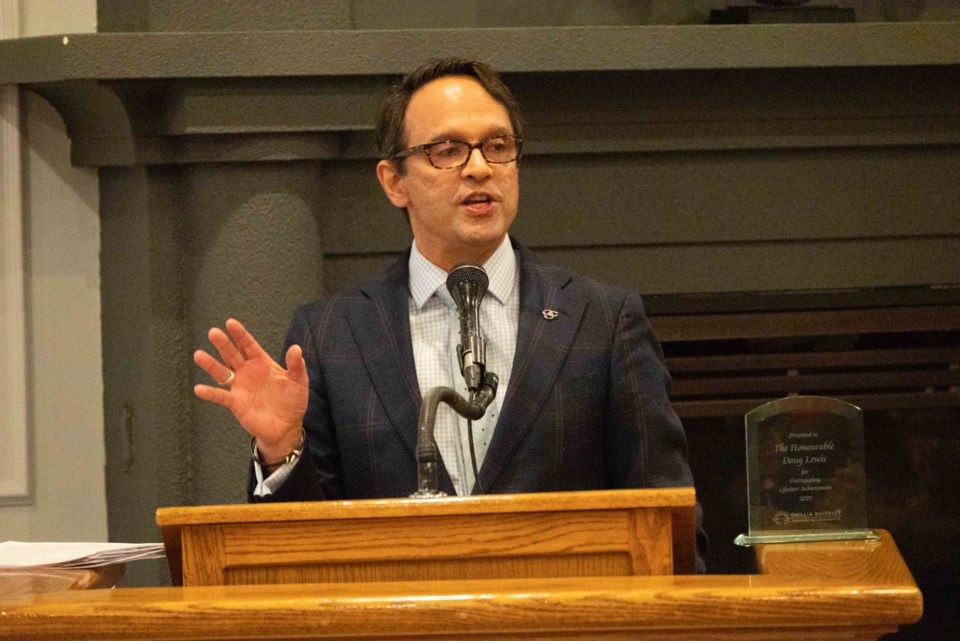Daniel Tisch, president of the Ontario Chamber of Commerce, painted a picture of global instability, economic uncertainty, and a need for resilience among Canadian businesses on Thursday evening.
While addressing Orillia's business community during the Orillia District Chamber of Commerce annual general meeting on Thursday evening at Hawk Ridge Golf Club, Tisch spoke against the backdrop of international trade tensions and political upheaval.
He urged business leaders to take action, advocate for their interests, and embrace opportunities amid the challenges.
Tisch emphasized the current economic landscape is one of rapid change and unpredictability. He contrasted today’s environment with the optimism of the late 1990s, a time marked by technological advancement, global cooperation, and economic growth.
Now, however, he noted political divisions and economic challenges have created an atmosphere in which it is harder to find common ground and work toward shared solutions.
“There’s so much instability, so much uncertainty,” Tisch said. “As business people, we like predictability, we like knowing the rules of the road. We want government to help, but also to get out of the way so we can create jobs and wealth.”
Tisch highlighted recent political events, including the resignation of Canada’s prime minister and the new U.S. administration’s decision to challenge trade relations with Canada.
He warned that such developments could have serious consequences for businesses and workers on both sides of the border.
One of Tisch’s main concerns was the growing possibility of a U.S.-Canada trade war. He criticized U.S. trade policies that he described as being based more on political narratives than economic facts.
Using a humorous analogy, he likened the U.S. president’s approach to a customer blaming Tim Hortons for selling too many donuts, calling it “subsidization.” Despite the challenges, Tisch stressed that Canada must stand firm.
“If Mr. Trump breaks the Canada-U.S.-Mexico trade agreement and imposes tariffs on Canada, we have to retaliate. Otherwise, we’ll face endless economic bullying," he told the Orillia gathering.
To counteract this uncertainty, Tisch has been actively working with American state chamber leaders and advocating for Canada’s economic interests in Washington. He highlighted the need for Ontario businesses to diversify their trade partnerships and reduce dependence on the U.S. market.
While calling on businesses to be proactive, Tisch also urged the government to take decisive action in supporting businesses. He stressed that small businesses — the "backbone of local economies' — must be protected.
“Ontario remains an incredible destination for investment,” Tisch said. “We have talent, a strong healthcare system, and safe communities. But this trade uncertainty has put investments on hold, and the sooner government resolves this uncertainty, the better for our economy.”
However, he cautioned against broad-stroke government interventions, such as COVID-era cash handouts, advocating instead for data-driven policies that target industries most at risk.
Tisch outlined a four-part strategy to help Ontario navigate the economic uncertainty that includes showing strength and confidence, stating that businesses must assert their value and push back against unfair trade policies.
He said the government must support business while policymakers must protect industries and remove barriers to growth.
He also encourages Ontario leaders to work with American business leaders to advocate for fair trade, and businesses to explore new markets and reduce reliance on U.S. trade.
He also emphasized the need to remove interprovincial trade barriers, which he said could boost Canada’s GDP by as much as 8 per cent.
Beyond immediate trade issues, Tisch highlighted the importance of investing in people. He called for greater funding for Ontario’s post-secondary education system, arguing that a well-educated workforce is one of the province’s biggest competitive advantages.
“If we’re going to spend billions supporting businesses today, shouldn’t we also invest in the future?” he asked.
Concluding his speech, Tisch reinforced the importance of business unity in times of crisis. He encouraged business leaders to engage in advocacy, stay informed, and collaborate to create a strong and prosperous Ontario.
“When we stand together, we represent all businesses, in every economic sector, in every community,” he said. “That makes us a force that government cannot ignore.”
Despite the challenges, Tisch remained hopeful, urging Ontario businesses to embrace both the difficulties and the opportunities that come with economic change.
“It’s easy to feel anxious,” he said. “But with uncertainty comes possibility. Together, let’s make prosperity possible.”
